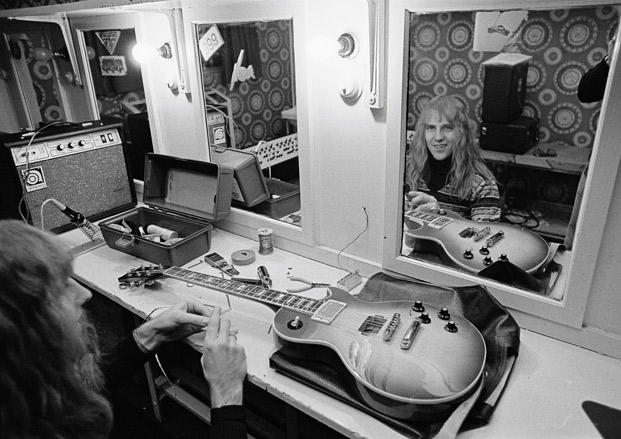Guitar 911: Five Guitar Repair Safety Tips
There are a lot of chemicals used on guitars, and there are safety issues with which to be concerned—for the guitar and the person using it.

I received an email from a reader who makes a very good point: When it comes to guitar repairs and maintenance, safety needs to be addressed.
So we will continue this story utilizing OSHA'S CFR 1910, the Occupational Safety and Health Administration's Code of Federal Regulations.
There are going to be a lot of chemicals referenced in this column over time. As it turns out, there are a lot of chemicals that ultimately wind up being used on guitars, and there are safety issues with which to be concerned—for the guitar and the person using it. And the person using it can be 7 years old to, well, the sky's the limit.
1. Most of the chemicals used on guitars happen to be flammable. This means no smoking or open flames during usage. This includes paint.
2. Beware of fumes. Breathe in Naptha (if you choose to use it) or some other type of paint thinner for a half hour or so, or really any other chemical we talk about in these stories, and you'll see why having good ventilation is very important. If you have a face mask available, use it. Personal Protective Equipment (PPE) is always recommended. Feel free to use gloves and safety goggles at any time.
3. Working on guitars and maintaining chemicals (and also tools, setup equipment, finishing products, etc.) causes storage concerns. After all, most of these chemicals being available only in quart sizes. Where do you keep your combustibles? When do they expire? When and how could they combust? You should know. Read the containers.
4. Chemicals have effects on guitars—on the finishes, the plastics and the hardware. Nail polish remover, acetone, alcohol; these will not react the same way on the surface of a pickup as they will the body as they're made out of different materials. Try to keep the application in mind. Reading the containers will help guide you as to proper usage.
All the latest guitar news, interviews, lessons, reviews, deals and more, direct to your inbox!
5. Now that I've gone over the technical stuff, let's hit the common sense. Don't leave it open somewhere. Don't drink it. Don't spray it in a different container and leave it unidentified for someone else to drink. Don't spray it in your eye. Don't spray it in anyone else's eyes. Don't try to set it on fire. It's a chemical and has the potential to be violent. It could hurt you or others and has specific purposes, one of which—when used correctly—is fixing up guitars.
Stay safe, and until next time...
Check out Joe Becker online at joebeckermusic.com.
